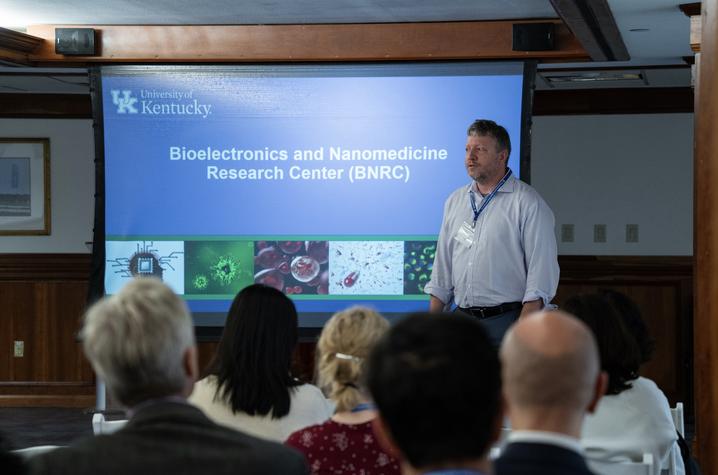Provost IMPACT Award: Tackling challenges in disease detection, treatment

LEXINGTON, Ky. (May 9, 2025) — Last fall, the University of Kentucky Office of the Provost announced the second cohort of the Institutional Multidisciplinary Paradigm to Accelerate Collaboration and Transformation (IMPACT) Awards winners.
The IMPACT Awards initiative, an internal funding program from the Office of the Provost, launched in 2023 to support innovation and transformation within UK’s colleges. The awards recognize the groundbreaking work conducted by faculty and staff across campus, and they create opportunities for transdisciplinary collaboration to occur between UK community members to help the university’s mission of advancing Kentucky.
This spring, UKNow is highlighting the 2024-25 IMPACT Award projects and the faculty who are leading them. In total, 15 colleges, including UK Libraries and the Graduate School, are working collectively to break new ground on ways to advance the state.
Today, we learn more about the project titled “Fostering Bioelectronics and Nanomedicine Innovation,” which explores how interdisciplinary collaboration and student-led research can accelerate the development of cutting-edge technologies to improve health care outcomes in Kentucky and beyond.
The team is led by:
- Samuel Awuah, Ph.D., associate professor of chemistry (College of Arts and Sciences);
- Alina Dorosh, administrative specialist;
- Ken Graham, Ph.D., associate professor of chemistry (College of Arts and Sciences);
- Mautin Barry-Hundeyin, M.D., Markey Cancer Center (UK HealthCare); and
- Chris Richards, Ph.D, professor of chemistry (College of Arts and Sciences).
The Bioelectronics and Nanomedicine Research Center (BNRC) accelerates innovation in biotechnology and bioelectronics at UK by emphasizing the development of core infrastructure to support breakthroughs in nanomedicine and bioelectronics. Ultimately, its mission is to unite leading faculty to tackle critical challenges in disease detection, treatment and monitoring.
UKNow caught up with the researchers to get insight into the project. You can read more in this Q&A session below.
How has the IMPACT award inspired innovation at UK with your research?
While faculty play a critical role in research, getting a new research center up and running depends largely on involvement from student researchers. It’s these students who will drive the research forward, teach each other, learn from each other and make the BNRC a vibrant and productive center.
“Fostering Bioelectronics and Nanomedicine Innovation” has recently announced the recipients of this year’s summer research program. The proposals aim to advance research in key areas, including spinal cord and traumatic brain injuries, neural repair, low-cost sensors for precision agriculture, and anti-thrombotic coatings to prevent blood clots during ECMO treatment.
These student-led projects will help build research collaborations between labs, develop institutional expertise, build the BNRC community and generate data, knowledge and expertise that will serve as the basis for large proposals to federal funding agencies.
Students will also gain expertise ranging from semiconductor fabrication to chemical synthesis and biological applications. Their work will support new therapeutics and health monitoring devices — improving healthcare across the state.
How did you decide on this particular topic or research area?
This IMPACT proposal emerged from the recently established BNRC, which focuses on addressing a critical gap in healthcare. The goal is to build multidisciplinary faculty engagement and core infrastructure for bioelectronics and nanomedicine.
Despite the natural links between biology, medicine and materials, biomedical research often lacks the infrastructure and transdisciplinary expertise needed to bridge materials science, biotechnology and bioelectronics. At the BNRC, we prioritize multidisciplinary faculty collaboration and the development of core infrastructure in nanomedicine and bioelectronics to drive innovation in devices, diagnostics and therapies.
What positive impact will your research have on Kentucky and beyond?
By enhancing the research infrastructure, the BNRC will establish UK as a leader in bioelectronics and nanomedicine.
Since its creation in January 2024, the BNRC has provided more than $80,000 in pilot award and core access funding — particularly in collaboration with the Markey Cancer Center and the Spinal Cord and Brain Injury Research Center (SCoBIRC), among others.
The data, knowledge and expertise generated through this IMPACT grant will lay the foundation for future proposals to federal funding agencies.
This initiative will also create broad opportunities across basic and translational research — leading to high-impact publications, patents, start-ups, job creation and improved patient care. Students will be central to this work — benefiting from cutting-edge training in a rapidly growing field, contributing to publications and entrepreneurial ventures and emerging as the next generation of researchers, physicians and nurses advancing bioelectronics and nanomedicine.
From an educational perspective, the grant offers a dynamic and relevant research experience to 15 UK students. All participants will develop skills in presenting their work and collaborating in a research setting. Graduate students will gain experience mentoring undergraduates, who in turn will sharpen their critical thinking and technical abilities.
We view the BNRC as the next major research center at UK, and this award is a key step in building its infrastructure and securing future federal support.
What comes next for your research?
We anticipate that the collaborations established through this IMPACT Award will position participants to be competitive for external funding and to expand career opportunities for graduate and undergraduate students who participate.
As the state’s flagship, land-grant institution, the University of Kentucky exists to advance the Commonwealth. We do that by preparing the next generation of leaders — placing students at the heart of everything we do — and transforming the lives of Kentuckians through education, research and creative work, service and health care. We pride ourselves on being a catalyst for breakthroughs and a force for healing, a place where ingenuity unfolds. It's all made possible by our people — visionaries, disruptors and pioneers — who make up 200 academic programs, a $476.5 million research and development enterprise and a world-class medical center, all on one campus.




